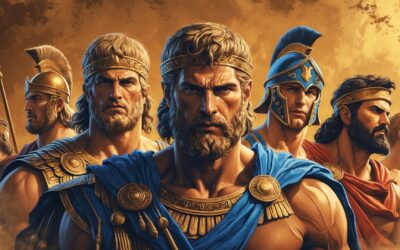- Exploring Immortality in Literature: The Glass Bead Game by Hermann Hesse
- Setting the Stage: The World of Castalia
- Josef Knecht: The Quest for Meaning
- Themes: The Human Condition and the Eternal Search
- A Layered Narrative
- The Legacy of The Glass Bead Game
- Why The Glass Bead Game Remains Immortal
- Let’s Talk
- Let’s Learn Vocabulary in Context
- Let’s Discuss & Write
- Let’s Play & Learn
Exploring Immortality in Literature: The Glass Bead Game by Hermann Hesse
The world of literature is often marked by works that transcend their time, resonating with readers across generations. Among such immortal masterpieces is Hermann Hesse’s The Glass Bead Game. Awarded the Nobel Prize in Literature in 1946, Hesse’s novel is an intricate tapestry of intellectual rigor, spiritual depth, and philosophical inquiry. Let us delve into this complex and thought-provoking work, exploring why it has earned its place as one of the pinnacles of modern literature.
Setting the Stage: The World of Castalia
The Glass Bead Game unfolds in Castalia, a fictional utopian society dedicated to intellectual and cultural pursuits. This elite province is home to the Order, a monastic-like community devoted to mastering the titular Glass Bead Game—a symbolic synthesis of human knowledge, art, and philosophy. Castalia serves as both a backdrop and a central character, embodying the tension between intellectual purity and the practicalities of real-world existence.
In Castalia, the Game is not merely a pastime but a profound art form, blending disciplines such as music, mathematics, literature, and science into an abstract, almost mystical harmony. Yet, this intellectual haven exists in stark contrast to the outside world, which is depicted as chaotic and mundane. The dichotomy between Castalia and the external world sets the stage for the novel’s philosophical explorations.
Josef Knecht: The Quest for Meaning
At the heart of The Glass Bead Game is Josef Knecht, a gifted scholar who rises to the esteemed position of Magister Ludi, or Master of the Game. Through Knecht’s journey, Hesse examines the limits of intellectualism and the need for a balanced life that incorporates both contemplation and action.
Knecht is a man of dualities—at once deeply committed to the ideals of Castalia and acutely aware of its shortcomings. Over time, he begins to question the insular nature of the Order and the Game itself. Is a life devoted solely to intellectual pursuits truly fulfilling? Or does it risk detachment from the human experience? These questions drive Knecht’s evolution and ultimately lead him to leave Castalia in pursuit of a more integrated and meaningful existence.
Themes: The Human Condition and the Eternal Search
Hesse’s novel is a treasure trove of themes, each inviting deep reflection.
- Intellectualism vs. Practicality: The Glass Bead Game critiques the overemphasis on intellectualism at the expense of lived experience. Castalia’s scholars, for all their brilliance, remain disconnected from the realities of the world—a flaw that Knecht comes to recognize.
- Spirituality and Self-Discovery: The novel explores the spiritual dimension of human existence, echoing Hesse’s fascination with Eastern philosophies. Knecht’s journey is not merely an intellectual quest but a spiritual odyssey toward self-understanding.
- The Transience of Human Achievement: While the Glass Bead Game symbolizes the pinnacle of human intellect, it also underscores the impermanence of even the most profound achievements. This theme is poignantly reflected in Knecht’s ultimate fate, which invites readers to contemplate the legacy of their own lives.
A Layered Narrative
One of the most fascinating aspects of The Glass Bead Game is its structure. The main narrative is accompanied by three fictional biographies of Josef Knecht’s past incarnations. These stories, along with Knecht’s poems and writings, serve as metaphors for his spiritual journey and enrich the novel’s overarching themes. This layered approach makes the novel a dense but rewarding read, offering new insights with each revisit.
The Legacy of The Glass Bead Game
Since its publication in 1943, The Glass Bead Game has captivated readers and scholars alike. Its philosophical depth and literary complexity ensure that it remains a subject of discussion in academic circles. Yet, it is more than an intellectual exercise; it is a meditation on what it means to live a meaningful life.
In a world increasingly driven by specialization and fragmented knowledge, Hesse’s novel is a reminder of the value of holistic thinking and the importance of balancing the mind, body, and spirit.
Why The Glass Bead Game Remains Immortal
The enduring appeal of The Glass Bead Game lies in its universality. Hesse grapples with questions that are as relevant today as they were in the mid-20th century: How do we reconcile the pursuit of knowledge with the need for human connection? What is the role of art and culture in shaping a meaningful life?
Hesse’s prose, though intricate and demanding, carries an almost hypnotic rhythm, drawing readers into the world of Castalia and the mind of Josef Knecht. This timeless quality ensures that the novel continues to resonate, inviting each new generation to engage with its profound insights.
The Glass Bead Game is not merely a novel; it is an intellectual and spiritual odyssey. Its intricate narrative, profound themes, and philosophical depth make it a cornerstone of world literature. Whether you are a first-time reader or revisiting it for the umpteenth time, Hesse’s masterpiece offers a journey of discovery that is as rewarding as the Glass Bead Game itself.
This immortal work challenges us to think deeply, live fully, and seek harmony between the intellectual and the human—a lesson as timeless as the novel itself.
Let’s Talk
So, let’s unpack The Glass Bead Game a bit further, shall we? Have you ever wondered if a life devoted entirely to intellectual pursuits is as fulfilling as it sounds? Castalia is this idyllic utopia for brainiacs—a place where ideas are currency, and the Glass Bead Game is their ultimate expression. Sounds dreamy, right? But here’s the thing: does isolating yourself in a bubble of intellectualism make you lose touch with reality?
Imagine living in a world where every decision revolves around an abstract game that combines math, music, and philosophy. Sure, it’s impressive, but doesn’t it sound a little… sterile? Like eating plain rice for every meal. Knecht, our protagonist, eventually gets this too. He realizes there’s more to life than lofty ideas. He starts to question whether Castalia’s elite scholars are actually doing any good for the world or just playing a really fancy, esoteric Sudoku.
Now let’s get practical for a second. Do we, in our own lives, sometimes build our little Castalias? Maybe it’s our academic bubble, professional circle, or even the echo chamber of our social media feeds. Are we too caught up in intellectual perfection or career achievements to connect with the messy, wonderful chaos of real life? If so, what’s our version of “leaving Castalia”? Is it volunteering, traveling, or just striking up a conversation with someone whose worldview doesn’t match ours?
Here’s a curveball: is it really so bad to have a place like Castalia—a retreat for deep thought—when the outside world can feel like a never-ending episode of reality TV? Maybe the problem isn’t Castalia itself but its detachment from the outside. What if scholars like Knecht could have one foot in the intellectual realm and one in the practical world? Isn’t that balance what we’re all striving for, even in our daily lives?
And speaking of balance, what about the Game itself? The way it weaves together art, science, and philosophy is fascinating, but would a game like that even work in today’s world? Could we create a version of the Glass Bead Game that helps us solve real-world problems instead of just being an intellectual flex? Maybe it’s not about mastering knowledge but connecting it to something meaningful, something that adds value to human life. What would your version of the Game look like?
At the end of the day, The Glass Bead Game is a reminder that intellectual brilliance is great, but it’s not enough. Life is more than a cerebral exercise—it’s about relationships, emotions, and the messy, unpredictable experiences that shape who we are. So, what’s your take? Is it better to strive for intellectual perfection or embrace the glorious chaos of the real world? Or maybe both?
Let’s Learn Vocabulary in Context
Let’s take a closer look at some of the words and phrases that came up while exploring The Glass Bead Game. These aren’t just fancy terms; they’re tools you can use in everyday conversations to sound sharp and articulate.
First up, “utopian”—this describes an ideal, almost-too-good-to-be-true society. Castalia is a utopian world, but you could also call your dream beach vacation utopian if it includes endless piña coladas and no emails.
How about “intellectual rigor”? This means a disciplined, thorough approach to thinking. Think of it as the mental equivalent of training for a marathon. If you’ve ever spent hours debating whether pineapple belongs on pizza, you’ve engaged in, uh, questionable intellectual rigor.
Next is “transcend”, which means to go beyond the limits of something. The Glass Bead Game transcends ordinary games by merging art, math, and philosophy. You could say a great movie transcends its genre, like how The Dark Knight isn’t just a superhero film—it’s a masterpiece.
Here’s a fun one: “esoteric”. This word refers to things understood by a small, specialized group. The Game in Hesse’s novel is esoteric, but so is your knowledge of every obscure Pokémon evolution.
“Synthesis” is another gem. It means combining different ideas into a whole. The Game is all about synthesis, blending music, math, and literature. In real life, you might create a synthesis of your favorite pizza toppings—pepperoni and pineapple, anyone?
Now let’s talk about “duality”. It’s the idea of two opposing forces coexisting, like Knecht’s struggle between intellectualism and practicality. Life itself is full of dualities—work and play, coffee and sleep, cats and dogs.
“Philosophical inquiry” sounds fancy, but it just means asking big, deep questions. Why are we here? What’s the meaning of life? Why does everyone ignore the grocery list and still buy chips?
Then there’s “holistic”, which means looking at the big picture. The novel suggests we need a holistic approach to life, balancing mind, body, and spirit. Even your wellness routine could be holistic—yoga for the body, meditation for the mind, chocolate for the soul.
“Impermanence” is another key word, meaning nothing lasts forever. It’s a theme in the novel and a truth of life. That’s why you savor your favorite ice cream before it melts—or disappears into someone else’s bowl.
Lastly, “odyssey”—a long, adventurous journey, often with personal growth. Knecht’s life is an odyssey, and so is surviving a family road trip with your sanity intact.
Let’s Discuss & Write
- Do you think intellectual pursuits alone can lead to a fulfilling life, or is a balance with practical experiences essential?
- If you lived in Castalia, would you be content dedicating your life to the Glass Bead Game, or would you feel restless for something more?
- Can you think of a modern equivalent to the Glass Bead Game that connects various fields of knowledge?
- Do you agree with Knecht’s decision to leave Castalia, or would you have stayed to reform the system from within?
- How can we apply the idea of “synthesis” in our everyday lives, whether at work, school, or in personal relationships?
Writing Prompt:
Imagine you are a member of Castalia, chosen to present a new rule or element to the Glass Bead Game. Write a short piece (300–400 words) explaining your idea, why it matters, and how it will improve the Game.
Tips:
- Start by describing your proposed rule or element in detail.
- Use examples to show how it would work in practice.
- End with a reflection on how it aligns with the Game’s purpose and why it will benefit Castalia.










0 Comments